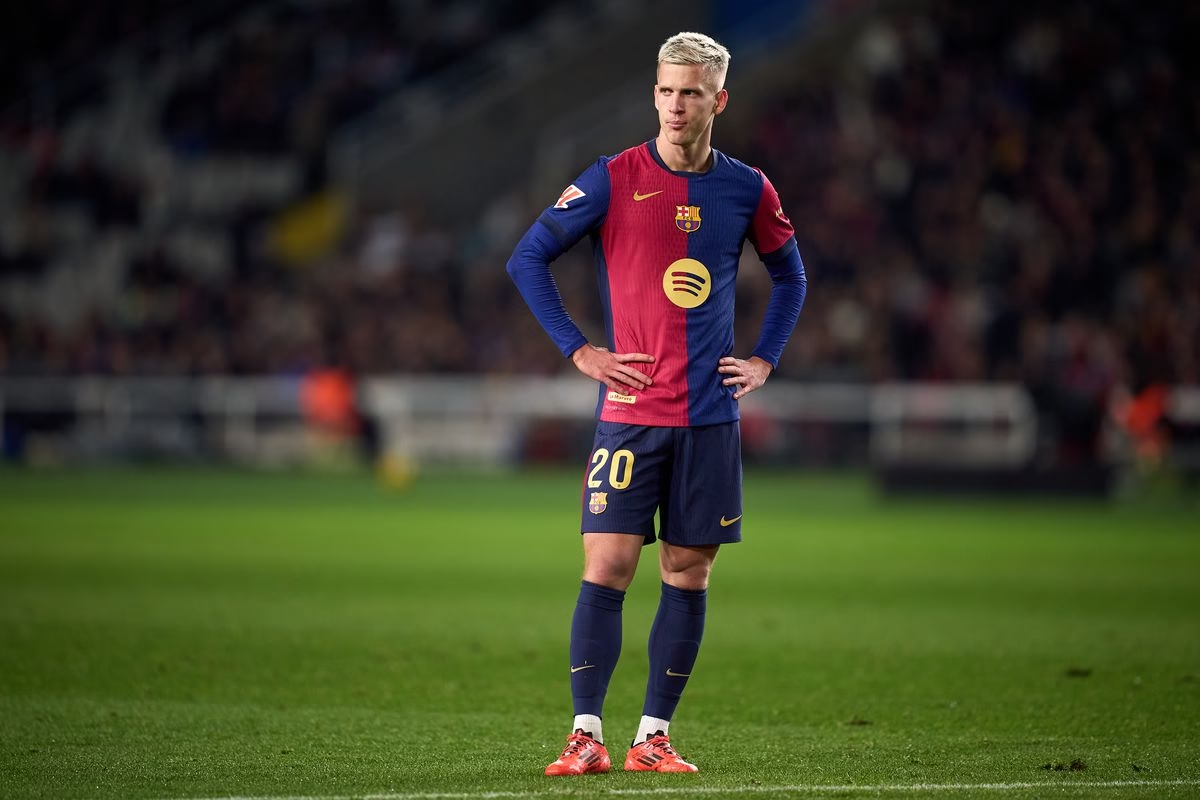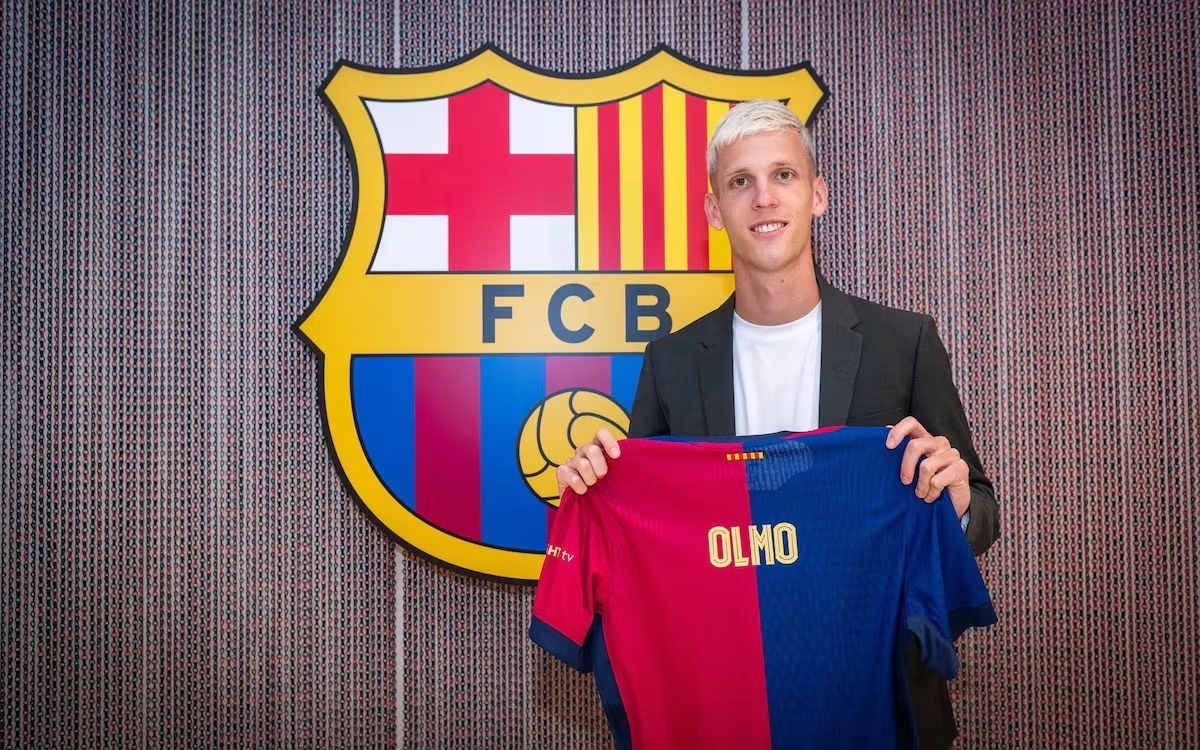The footballing world is abuzz with the latest controversy involving FC Barcelona, La Liga, and the potential transfer of Spanish international Dani Olmo. The saga, steeped in administrative complexities, financial regulations, and registration dilemmas, highlights the ongoing challenges Barcelona faces in navigating La Liga’s stringent financial rules.
This article delves into the specifics of the Dani Olmo transfer case, examining the positions of the parties involved, the implications for Barcelona and La Liga, and expert opinions on the matter.
The Transfer of Dani Olmo: A Strategic Move
Dani Olmo, one of Spain’s brightest talents, has been on the radar of top European clubs due to his consistent performances for RB Leipzig and the Spanish national team. The versatile attacking midfielder is known for his creativity, work rate, and ability to score crucial goals.
Barcelona, keen to bolster their midfield options, identified Olmo as a priority target for the summer transfer window. The move made sense on multiple fronts:
- Tactical Fit: Olmo’s ability to play across midfield and forward lines makes him a perfect addition to Xavi Hernandez’s fluid tactical setup.
- Youth and Potential: At 25, Olmo represents a long-term investment, aligning with Barcelona’s recent focus on younger players.
- Catalonian Roots: Having spent his early years at Barcelona’s famed La Masia academy, Olmo’s return would symbolize a homecoming, appealing to fans nostalgic for the club’s golden era.
The reported transfer fee of around €40 million was seen as a reasonable price for a player of Olmo’s caliber, especially given Barcelona’s financial struggles in recent years.
La Liga’s Financial Fair Play Rules: The Barrier
While the deal seemed straightforward, Barcelona’s ongoing struggles with La Liga’s Financial Fair Play (FFP) regulations have complicated the transfer. La Liga has imposed strict spending limits on clubs to ensure financial sustainability, and Barcelona, burdened by massive debts, has found itself on the wrong side of these regulations.
Key Issues:
- Salary Cap Breach: Barcelona’s wage bill exceeds La Liga’s prescribed limits, making it difficult for the club to register new players without offloading existing ones.
- Transfer Spending: La Liga requires clubs to maintain a balance between income and expenditure, which includes transfer fees, player salaries, and amortization costs.
- Revenue Generation: Despite recent efforts to boost revenue through sponsorships and asset sales, Barcelona’s financial position remains precarious.
Barcelona had hoped that the departure of high-earning players like Ousmane Dembélé and the restructuring of contracts for veterans like Sergio Busquets and Gerard Piqué would create room for Olmo’s registration. However, La Liga officials reportedly flagged the transfer, citing concerns over compliance with FFP regulations.
La Liga’s Stance
La Liga, under the leadership of Javier Tebas, has taken a hardline approach to enforcing financial rules. The league’s administration has argued that bending the rules for Barcelona would set a dangerous precedent, undermining the financial integrity of the competition.
In a statement, a La Liga representative explained:
“We understand the importance of marquee signings for the league’s global appeal, but our priority is to maintain a financially sustainable model for all clubs. Barcelona must demonstrate compliance with the salary cap and revenue-generation requirements before registering new players.”
La Liga’s firm stance has drawn both praise and criticism. While some view it as a necessary step to ensure fairness, others argue that it disproportionately affects clubs like Barcelona, which play a significant role in the league’s global popularity.
Barcelona’s Defense
Barcelona has pushed back against La Liga’s decision, arguing that the club has taken significant steps to stabilize its finances. Club officials have cited the following measures as evidence of their commitment to compliance:
- Player Sales: Barcelona has offloaded several players, including Dembélé, to reduce the wage bill.
- Sponsorship Deals: The club recently secured lucrative partnerships with brands like Spotify and Nike.
- Cost-Cutting Initiatives: Barcelona has renegotiated contracts and reduced operational expenses to improve financial health.
Club president Joan Laporta expressed frustration with La Liga’s stringent approach, stating:
“We have followed the rules and made sacrifices to meet financial targets. The rejection of Dani Olmo’s registration is a setback not just for Barcelona but for Spanish football. We remain committed to resolving this issue amicably.”
Impact on Dani Olmo and RB Leipzig

The transfer saga has placed Dani Olmo in a challenging position. The player, reportedly eager to return to his boyhood club, now faces uncertainty about his future.
For RB Leipzig, the situation is equally complicated. While the club has expressed willingness to facilitate the transfer, delays in finalizing the deal could disrupt their plans for the season. Losing a key player like Olmo without ample time to find a replacement would be a significant blow.
Views from Pundits and Legends
The controversy has sparked widespread debate among football experts and former players.
Gary Lineker, former Barcelona striker and football pundit:
“Barcelona’s financial woes are a cautionary tale for clubs chasing immediate success at the expense of sustainability. However, La Liga must find a balance between enforcing rules and supporting its marquee clubs. Losing players like Dani Olmo to other leagues would hurt Spanish football’s global standing.”
Cesc Fàbregas, ex-Barcelona midfielder:
“Olmo is a fantastic player, and his return to Barcelona would be a perfect fit. I hope both sides can find a resolution. Spanish football needs talents like Olmo playing at the highest level.”
Jamie Carragher, former Liverpool defender and analyst:
“La Liga’s financial rules are necessary, but they seem to disproportionately target Barcelona. It’s crucial to ensure fairness, but the league must also recognize the value of having its top clubs thrive on the global stage.”
What’s Next? Possible Scenarios
- Resolution and Registration: Barcelona could make additional player sales or secure new revenue streams to comply with La Liga’s requirements, paving the way for Olmo’s registration.
- Loan Deal: To bypass FFP restrictions, Barcelona might consider signing Olmo on a loan deal with an obligation to buy in the future.
- Transfer Collapse: If no resolution is reached, Olmo may remain at RB Leipzig or explore other options, with interest from Premier League and Serie A clubs reportedly growing.
The Broader Implications
The Dani Olmo transfer saga is more than just a story about one player. It reflects the broader challenges faced by clubs operating in a financially regulated environment. For Barcelona, the case highlights the ongoing tension between their ambitions and financial realities.
For La Liga, the controversy underscores the importance of balancing enforcement with flexibility. While strict financial rules are necessary for sustainability, they must not stifle the competitiveness and appeal of the league.
Conclusion
The Dani Olmo transfer saga is a defining moment for both FC Barcelona and La Liga. As the drama unfolds, it remains to be seen whether a resolution can be reached that satisfies all parties. For now, fans, pundits, and players alike will be watching closely, eager to see how this chapter in Spanish football concludes.
Check More:
Liverpool’s Contract Extension Saga: Key Players at the Heart of Negotiations

